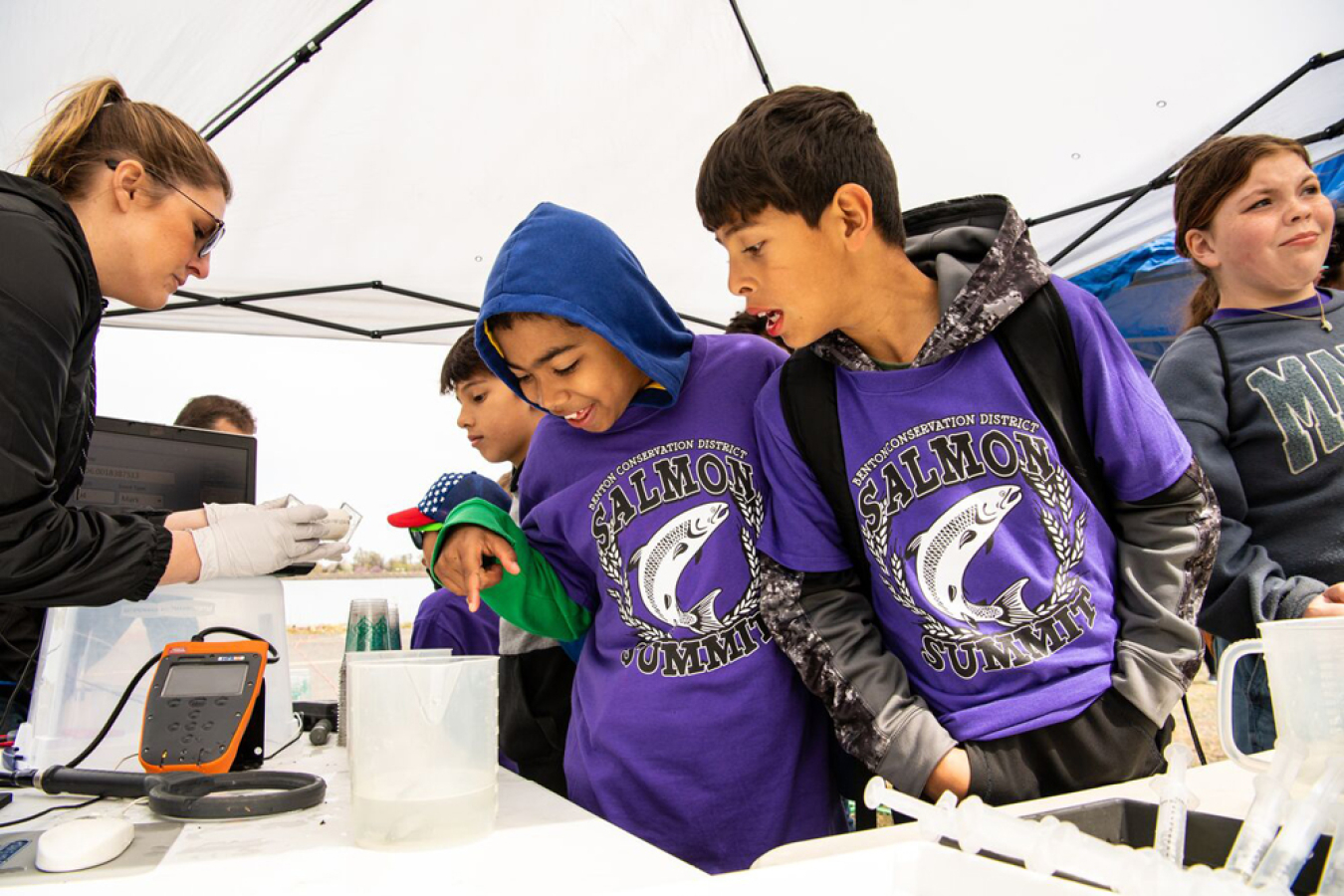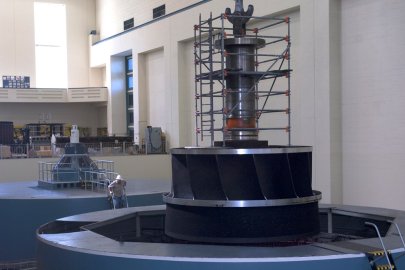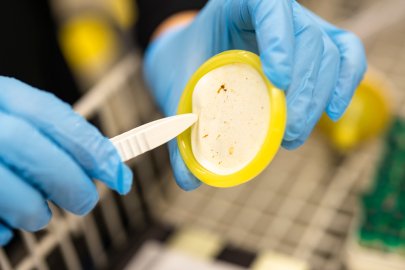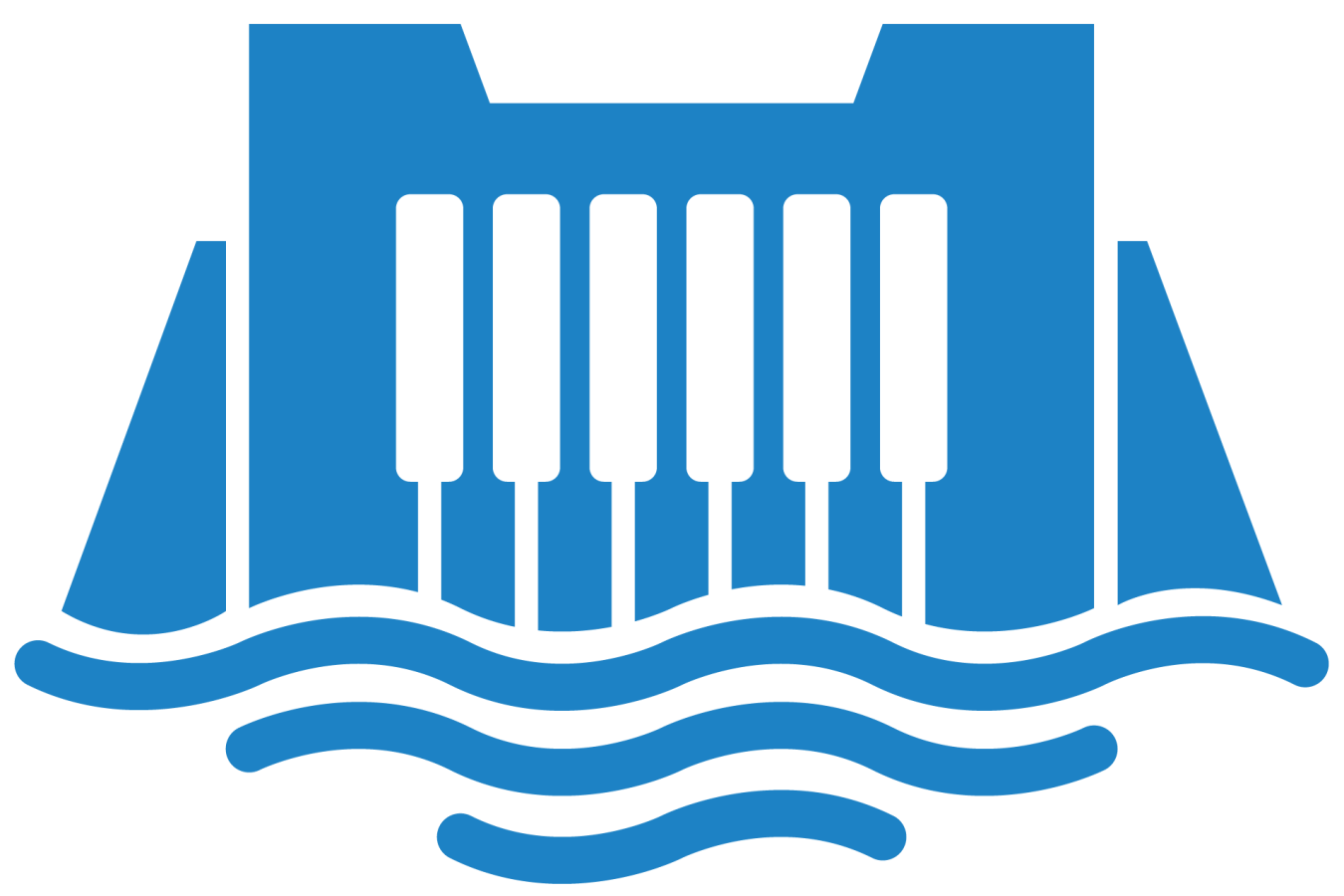Pacific Northwest National Laboratory supported the 25th annual Salmon Summit, an educational event in eastern Washington designed in part to inspire the next generation of hydropower researchers, diverse STEM professionals, and a science-aware community.
Water Power Technologies Office
March 14, 2024Hydropower Program
Environmental and Hydrologic Systems Science
Project Name: Salmon Summit
Project Team: Benton Conservation District (lead) and Pacific Northwest National Laboratory
Lead Recipient Location: Kennewick, Washington

The 25th annual Salmon Summit, held in April 2023, marked a rite of passage for fourth and fifth graders from Benton County, Washington, to learn about salmon and how they move through the rivers that pass by their schools. Students from Washington's Tri-Cities area and beyond see how fish are tagged to monitor their movements through hydropower facilities and are introduced to different careers in fish passage research, such as biology, data science, engineering, and communications. This program also encourages stewardship of natural resources and helps students understand ways to monitor potential impacts from energy systems.
Salmon Summit is the culminating activity of an annual Salmon in the Classroom curriculum, which helps students realize that salmon are a keystone species of eastern Washington's rivers. Classroom lessons on salmon anatomy and life cycle complement science and math curriculums, while historical and cultural lessons about salmon relate to Washington's history, social studies, and geography.

At the summit, Pacific Northwest National Laboratory (PNNL) fish passage experts—many of whom discovered an interest in science, technology, engineering, and math (STEM) careers through similar events they attended as students—explain how data collected about migrating salmon increase understanding of their passage through hydroelectric dams and inform even safer designs and operations. Approximately 500 students participate in PNNL's tagging station each year. In total, about 2,500 students attend the Salmon Summit, and another 3,000 benefit from the experience virtually in their classrooms. By livestreaming its tagging station to classrooms across the state, PNNL helped to more than double the number of students who could participate virtually in the Salmon Summit.
During tagging, each fish was implanted with a passive tag, known as a PIT tag, that has a unique code that allows researchers to identify fish throughout their life. Certain passage routes at downstream dams have detection equipment to identify fish as they swim by, and PNNL monitors these detections using a centralized database.
Whether in-person or streamed, Salmon Summit gets students outside for experiential learning, which is critical to reinforcing lessons from the classroom. Teachers noted that this event allowed students to connect the raising of salmon in their classrooms with jobs available in their community, generating discussion and interest in available careers. The event also highlighted the integration of technical disciplines, including how technology can be used to learn about salmon, which supports Washington State Science and Learning Standards.
Benton Conservation District has led the Salmon Summit for more than two decades. The U.S. Department of Energy's Water Power Technologies Office (WPTO) has supported it since 2021 to provide a virtual opportunity for students to engage.
Pacific Northwest National Laboratory staff at Salmon Summit 2023 discuss the many career paths available to support fish passage and water power.
In addition to Salmon Summit, PNNL supports a variety of educational programs for both teachers and students. One example is Teacher-Scientist Partnership (TSP), an annual professional development program for upper elementary, middle, and high school STEM teachers where participants solve scenario-based problems from the real world and align them with Washington State Science and Learning Standards.
The 2023 TSP was developed to deepen the learning for teachers who participated in the 2023 Salmon Summit. TSP participants were challenged to develop recommendations for long-term monitoring approaches for fish populations within Washington’s Columbia River Basin. As part of this training, teachers were guided through the challenge by PNNL biologists, data scientists, and communicators. The week featured hands-on activities and tours, including a guided tour of McNary Dam from the U.S. Army Corps of Engineers, and concluded with the teachers presenting their recommendations to experts from PNNL and WPTO. Connecting research and classroom experiences through efforts like TSP helps both educators and PNNL researchers guide the next generation of STEM professionals, teachers, and a science-aware community.
-
 Pacific Northwest National Laboratory supported the 25th annual Salmon Summit, an educational event in eastern Washington designed in part to inspire the next generation of hydropower researchers, diverse STEM professionals, and a science-aware community.
Pacific Northwest National Laboratory supported the 25th annual Salmon Summit, an educational event in eastern Washington designed in part to inspire the next generation of hydropower researchers, diverse STEM professionals, and a science-aware community. -
 National laboratory researchers examined and published a report on how climate change may affect water availability for federal hydropower marketing and generation and its impact on future energy demand.
National laboratory researchers examined and published a report on how climate change may affect water availability for federal hydropower marketing and generation and its impact on future energy demand. -
 Researchers used a variety of sampling techniques to consistently and accurately measure methane and carbon emissions from six hydropower reservoirs
Researchers used a variety of sampling techniques to consistently and accurately measure methane and carbon emissions from six hydropower reservoirs -
 A biodegradable and nontoxic hydropower oil has gone through several rounds of testing as its developer aims to ramp up production to achieve commercialization in the next few years.
A biodegradable and nontoxic hydropower oil has gone through several rounds of testing as its developer aims to ramp up production to achieve commercialization in the next few years. -
 Oak Ridge National Laboratory improved upon fish species detection and counting using environmental DNA and RNA sequencing, potentially saving time, decreasing costs, and reducing environmental impacts on aquatic species and habitats.
Oak Ridge National Laboratory improved upon fish species detection and counting using environmental DNA and RNA sequencing, potentially saving time, decreasing costs, and reducing environmental impacts on aquatic species and habitats. -
 A new, nontoxic antibiofouling coating reduced the adhesion of algae, mussels, and larva on flat surfaces, rope, nets, and other materials used in the hydropower and marine energy sectors.
A new, nontoxic antibiofouling coating reduced the adhesion of algae, mussels, and larva on flat surfaces, rope, nets, and other materials used in the hydropower and marine energy sectors.
WPTO's hydropower e-newsletter features news on R&D and applied science to advance sustainable hydropower and pumped-storage technologies.
The WPTO e-newsletter brings funding opportunities, events, publications, & hydropower and marine energy updates directly to your inbox.


